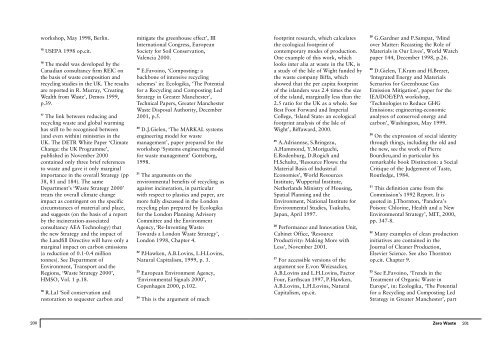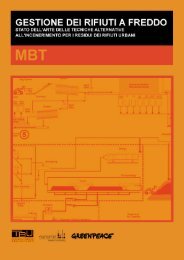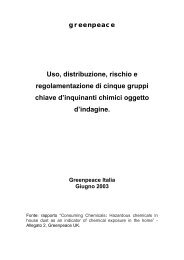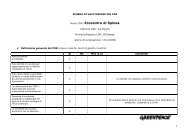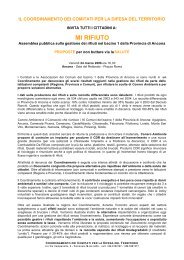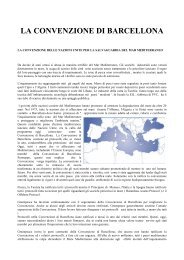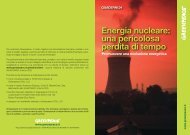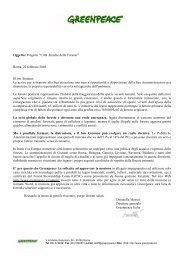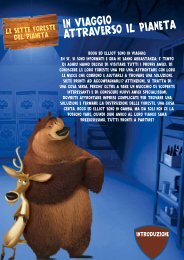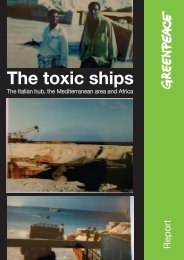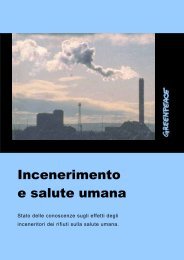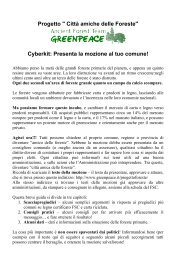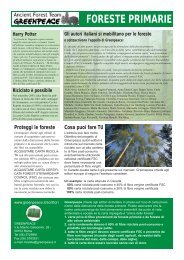Zero Waste by Robin Murray, Greenpeace Environmental Trust 2002
Zero Waste by Robin Murray, Greenpeace Environmental Trust 2002
Zero Waste by Robin Murray, Greenpeace Environmental Trust 2002
You also want an ePaper? Increase the reach of your titles
YUMPU automatically turns print PDFs into web optimized ePapers that Google loves.
workshop, May 1998, Berlin.<br />
15<br />
USEPA 1998 op.cit.<br />
1 6<br />
The model was developed <strong>by</strong> the<br />
Canadian consultancy firm REIC on<br />
the basis of waste composition and<br />
recycling studies in the UK. The re s u l t s<br />
a re re p o rted in R. Murr a y, ‘Cre a t i n g<br />
Wealth from <strong>Waste</strong>’, Demos 1999,<br />
p.39.<br />
17<br />
The link between reducing and<br />
recycling waste and global warming<br />
has still to be recognised between<br />
(and even within) ministries in the<br />
UK. The DETR White Paper ‘Climate<br />
Change: the UK Programme’,<br />
published in November 2000<br />
contained only three brief references<br />
to waste and gave it only marginal<br />
importance in the overall Strategy (pp<br />
38, 81 and 184). The same<br />
Department’s ‘<strong>Waste</strong> Strategy 2000’<br />
treats the overall climate change<br />
impact as contingent on the specific<br />
circumstances of material and place,<br />
and suggests (on the basis of a report<br />
<strong>by</strong> the incineration-associated<br />
consultancy AEA Technology) that<br />
the new Strategy and the impact of<br />
the Landfill Directive will have only a<br />
marginal impact on carbon emissions<br />
(a reduction of 0.1-0.4 million<br />
tonnes). See Department of<br />
Environment, Transport and the<br />
Regions, ‘<strong>Waste</strong> Strategy 2000’,<br />
HMSO, Vol. 1 p.18.<br />
18<br />
R.Lal ‘Soil conservation and<br />
restoration to sequester carbon and<br />
mitigate the greenhouse effect’, III<br />
International Congress, European<br />
Society for Soil Conservation,<br />
Valencia 2000.<br />
19<br />
E.Favoino, ‘Composting: a<br />
backbone of intensive recycling<br />
schemes’ in: Ecologika, ‘The Potential<br />
for a Recycling and Composting Led<br />
Strategy in Greater Manchester’,<br />
Technical Papers, Greater Manchester<br />
<strong>Waste</strong> Disposal Authority, December<br />
2001, p.5.<br />
20<br />
D.J.Gielen, ‘The MARKAL systems<br />
engineering model for waste<br />
management’, paper prepared for the<br />
workshop ‘Systems engineering model<br />
for waste management’ Gotteborg,<br />
1998.<br />
21<br />
The arguments on the<br />
environmental benefits of recycling as<br />
against incineration, in particular<br />
with respect to plastics and paper, are<br />
more fully discussed in the London<br />
recycling plan prepared <strong>by</strong> Ecologika<br />
for the London Planning Advisory<br />
Committee and the Environment<br />
Agency, ‘Re-Inventing <strong>Waste</strong>:<br />
Towards a London <strong>Waste</strong> Strategy’,<br />
London 1998, Chapter 4.<br />
22<br />
P.Hawken, A.B.Lovins, L.H.Lovins,<br />
Natural Capitalism, 1999, p. 3.<br />
23<br />
European Environment Agency,<br />
‘<strong>Environmental</strong> Signals 2000’,<br />
Copenhagen 2000, p.102.<br />
24<br />
This is the argument of much<br />
footprint research, which calculates<br />
the ecological footprint of<br />
contemporary modes of production.<br />
One example of this work, which<br />
looks inter alia at waste in the UK, is<br />
a study of the Isle of Wight funded <strong>by</strong><br />
the waste company Biffa, which<br />
showed that the per capita footprint<br />
of the islanders was 2.4 times the size<br />
of the island, marginally less than the<br />
2.5 ratio for the UK as a whole. See<br />
Best Foot Forward and Imperial<br />
College, ‘Island State: an ecological<br />
footprint analysis of the Isle of<br />
Wight’, Biffaward, 2000.<br />
25<br />
A.Adriannse, S.Bringezu,<br />
A.Hammond, Y.Moriguchi,<br />
E.Rodenburg, D.Rogich and<br />
H.Schultz, ‘Resource Flows: the<br />
Material Basis of Industrial<br />
Economies’, World Resources<br />
Institute, Wuppertal Institute,<br />
Netherlands Ministry of Housing,<br />
Spatial Planning and the<br />
Environment, National Institute for<br />
<strong>Environmental</strong> Studies, Tsukuba,<br />
Japan, April 1997.<br />
26<br />
Performance and Innovation Unit,<br />
Cabinet Office, ‘Resource<br />
Productivity: Making More with<br />
Less’, November 2001.<br />
27<br />
For accessible versions of the<br />
argument see E.von Weizsacker,<br />
A.B.Lovins and L.H.Lovins, Factor<br />
Four, Earthscan 1997, P.Hawken,<br />
A.B.Lovins, L.H.Lovins, Natural<br />
Capitalism, op.cit.<br />
28<br />
G.Gardner and P.Sampat, ‘Mind<br />
over Matter: Recasting the Role of<br />
Materials in Our Lives’, World Watch<br />
paper 144, December 1998, p.26.<br />
29<br />
D.Gielen, T.Kram and H.Brezet,<br />
‘Integrated Energy and Materials<br />
Scenarios for Greenhouse Gas<br />
Emission Mitigation’, paper for the<br />
IEA/DOE/EPA workshop,<br />
‘Technologies to Reduce GHG<br />
Emissions: engineering-economic<br />
analyses of conserved energy and<br />
carbon’, Washington, May 1999.<br />
30<br />
On the expression of social identity<br />
through things, including the old and<br />
the new, see the work of Pierre<br />
Bourdieu,and in particular his<br />
remarkable book Distinction: a Social<br />
Critique of the Judgement of Taste,<br />
Routledge, 1984.<br />
31<br />
This definition came from the<br />
Commission’s 1992 Report. It is<br />
quoted in J.Thornton, ‘Pandora’s<br />
Poison: Chlorine, Health and a New<br />
<strong>Environmental</strong> Strategy’, MIT, 2000,<br />
pp. 347-8.<br />
32<br />
Many examples of clean production<br />
initiatives are contained in the<br />
Journal of Cleaner Production,<br />
Elsevier Science. See also Thornton<br />
op.cit. Chapter 9.<br />
33<br />
See E.Favoino, ‘Trends in the<br />
Treatment of Organic <strong>Waste</strong> in<br />
Europe’, in: Ecologika, ‘The Potential<br />
for a Recycling and Composting Led<br />
Strategy in Greater Manchester’, part<br />
200<br />
<strong>Zero</strong> <strong>Waste</strong><br />
201


